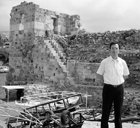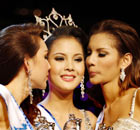Foreign and Military Affairs
Russia visit 'signal of shared history'
By Sun Shangwu (China Daily)
Updated: 2010-05-10 07:05
 |
Large Medium Small |
Hu says Beijing and Moscow must seek new global order
MOSCOW - President Hu Jintao attended Sunday's celebrations of the 65th anniversary of Russia's victory in the Great Patriotic War against Nazi Germany, a visit analysts said will strengthen relations by remembering a period of history tied by flesh and blood.
 President Hu Jintao, fl anked by Russian President Dmitry Medvedev (left) and German Chancellor Angela Merkel and Russian Prime Minister Vladimir Putin (right), watches the military parade at Moscow’s Red Square on Sunday in celebration of the 65th anniversary of the victory over Nazi German. [Agencies] |
Hu joined other leaders in a series of activities, including a military parade at Red Square, a wreath-laying ceremony at the Tomb of the Unknown Soldier, and a banquet hosted by Russian President Dmitry Medvedev.
Medvedev pledged last week to safeguard that historic achievement as there are now "attempts with a political purpose to distort the history" of the war.
Hu defended Russia's role in the war.
"China and Russia share the same stance on World War II," he said.
Beijing and Moscow must resolutely defend the authenticity of history, he said.
When he met Russian WWII veterans on Saturday, Hu said the two nations should strive to push for a "multi-polar and democratic world".
He also called for a new "concept of security", urging people to learn lessons from WWII and maintain peace and development in today's world by increasing mutual trust and respecting diverse civilizations.
China and Russia, as permanent members of the UN Security Council, should increase strategic coordination and make joint efforts to build a new international political order, he added.
Setting the Victory Day parade as a multilateral diplomatic platform will also consolidate Russia's position in foreign relations and create a better exterior environment for its development, analysts said.
Leaders from about 20 countries, as well as the heads of members of the Commonwealth of Independent States and some international organizations, were in attendance in Moscow.
Hu's presence shows China and Russia's support of each other, political observers said.
"It is a signal of great support to Russia," said Xing Guangcheng, a senior scholar at the Chinese Academy of Social Sciences.
Hu's tightly-scheduled weekend visit, which follows his attendance at the 60th anniversary of Russia's Victory Day five years ago, focused primarily on activities commemorating the role that Soviet Union and veteran soldiers played in WWII.
"It carries the signal that China firmly recognizes the Soviet Union's contribution (in WWII), and China will never forget the role the Soviet Union played in helping shorten China's War of Resistance against Japanese Aggression," Xing said.
The progress of the Great Patriotic War and China's War of Resistance against Japanese Aggression (1937-45) were linked.
The huge sacrifices China made in the Asian battlefield greatly contained Japan's military's muscle from extending to the European theater of operations, which helped the Soviet Union win the war against Nazi Germany.
The former Soviet Union sent troops to the Northeast China battlefront in August 1945, and the level of the two countries' military cooperation began to accelerate since then.
 World War II veterans leave Red Square after attending a military parade in Moscow on Sunday. [Agencies] |
"It shows China's will to promote Sino-Russian cooperation on historical issues and their strategic partnership," Luzyanin was quoted by Xinhua News Agency as saying.
The coordination and friendship between China and Russia built in that period has been turned into fruitful cooperation in the economic, political and cultural spheres, Luzyanin said.
Chinese Foreign Minister Yang Jiechi said in March that bilateral ties between China and Russia have set a model for big-power relations.
"Russia has always given priority to China in its overall foreign policy. With similar global strategies, the two countries often hold the same view and have close interaction and coordination on global affairs," said Wang Haiyun, a former military attach at the Chinese embassy in Russia.












